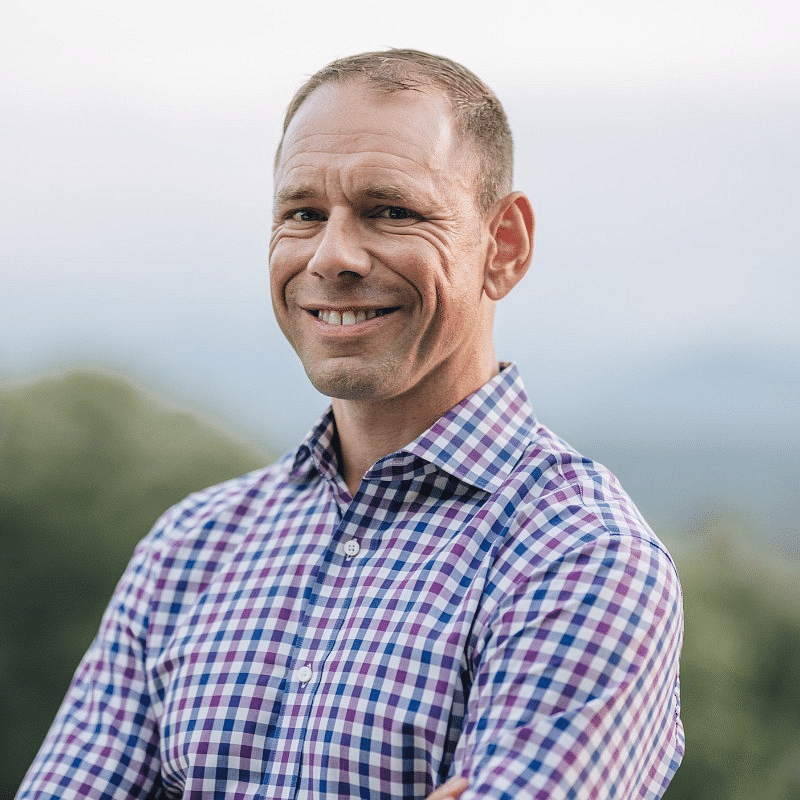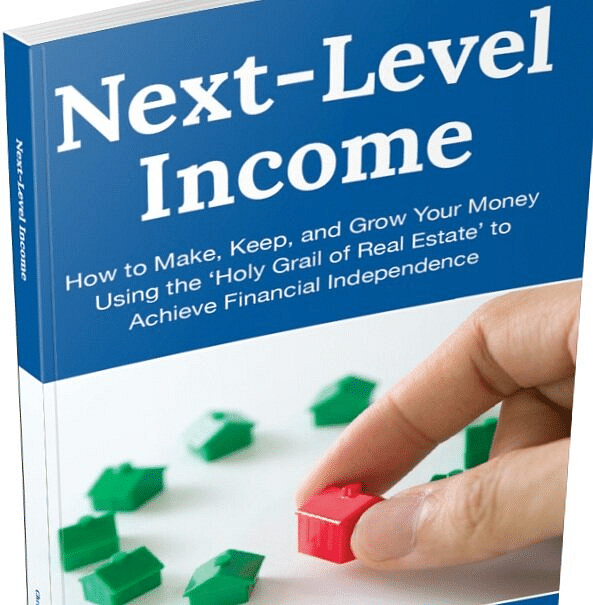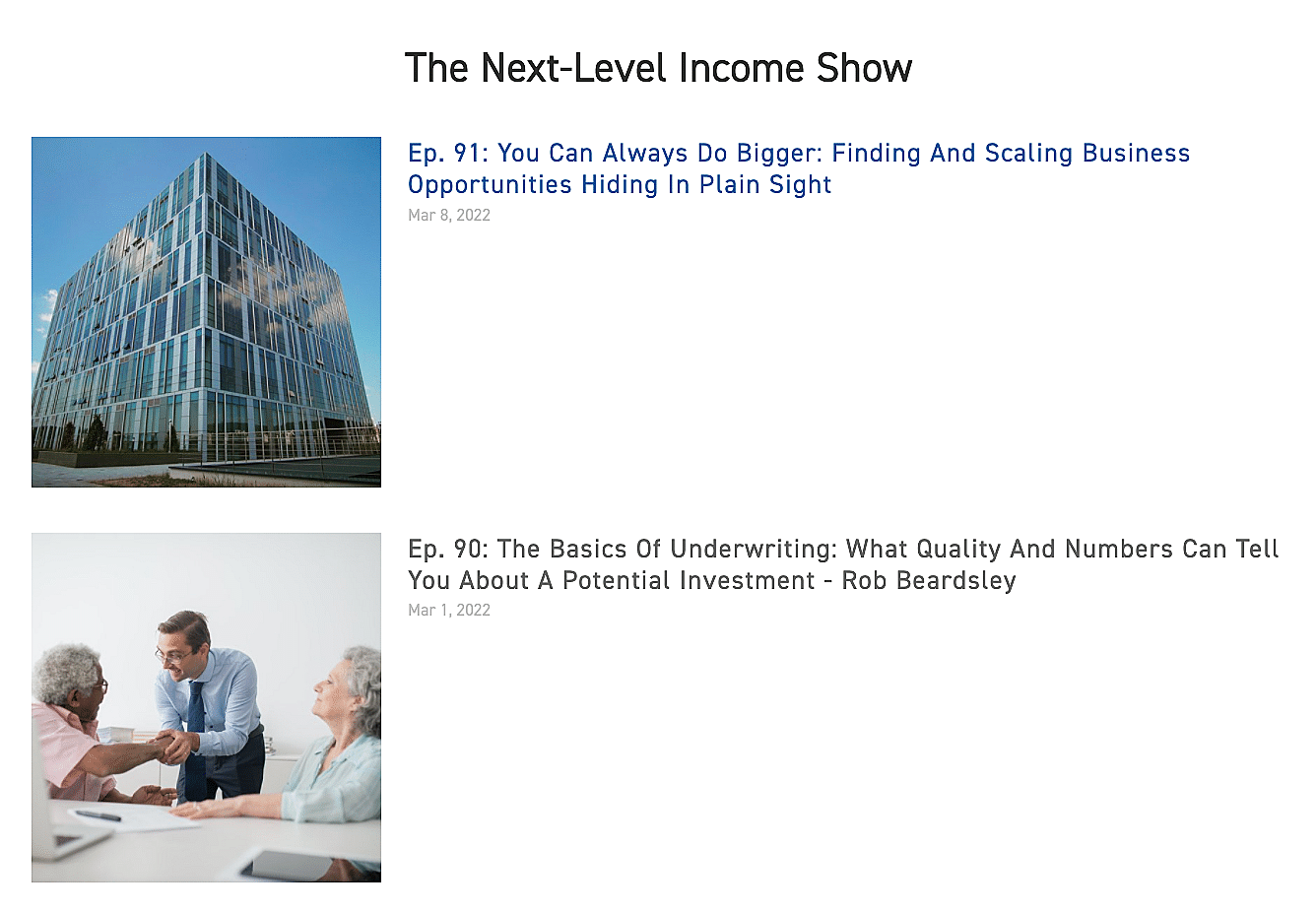
By automating authenticity, you can level up your noticeability. Next-Level Income founder Chris Larsen shares how.
By Jim James, Founder EASTWEST PR and Host of The UnNoticed Entrepreneur.
Podcasts bring people from around the world together. It’s kind of an audio tourism wherein we get to wander around and meet wonderful people. Joining me from Asheville in North Carolina, Chris Larsen runs a company called Next-Level Income.
In the new episode of The UnNoticed Entrepreneur podcast, he discussed his business and how he got noticed himself. He also talked about automating authenticity, especially in something as sensitive as the financial industry.
Image from LinkedIn
How Vital Communication Is
Chris has been in sales since he was about 12 years old. He spent 18 years in the medical device industry, working with surgeons, orthopaedic surgeons, and neurosurgeons and going into the operating room (OR). The outcomes that he saw for patients were very important.
Finances are an important and sensitive topic. But his pedigree is coming out of the OR and he was dealing with something that’s even more important — health.
Back then, he was working one-on-one with a very small group of “customers,” usually from five to 10. It was very easy to be authentic and have those one-on-one conversations. But during that process, he (who’s an engineer by training) was always seeking to systematise the different parts of the process so that he could have the best and most consistent outcomes possible and make sure that the equipment is there.
Chris took that same structure and thought, “How can I apply that to an audience in the financial realm, to those who are investing in those sorts of things?”
One of the things that he talks about is automating authenticity. This doesn’t mean being inauthentic. But if you’re working with a hundred or a thousand people, how do you remember special occasions? How do you make sure that you’re impacting someone’s life in a way that’s important to them?
First things first: communication. He shared that he starts every relationship with an investor with a one-on-one call.
He had one just a couple of weeks ago. This investor and her husband said, “Wow! You still do these calls with every single person that you bring on board?” He responded yes. He does about two calls a day.
Image from Unsplash
He also takes notes. He uses HubSpot, a customer relationship management (CRM) software. He makes sure that he has different things that refer to that person. Are they married? Do they have children? What’s their why — Why are they having these phone calls? These help him go back and remember and focus on what’s important to that person.
This isn’t being inauthentic. When you step onto a used car lot and the salesperson is trying to sell you a sports car, that salesperson isn’t going to be successful because he doesn’t know the reasons that you’re there.
This is how he starts out — with communication. He makes sure that he pinpoints those things that are important. It’s also about having a system to make sure that he and his clients are communicating consistently on an effective basis after their initial phone call.
How He Attracts Leads
Chris shared that he has already built a funnel of sorts.
Anyone who comes into his community — whether they joined the podcast list, they’re interested in coaching, or learning more about his company’s investment opportunities — there’s a separate form to be filled out. It’s a very short form that takes a couple of minutes to finish. This allows him and his team to have that information; when they get on a phone call, they’re already there.
If it’s for a strategy session and he might have to coach a client, the form would ask the client’s number one goal for the year and if there are any obstacles that they’re facing. The form asks about anything that’s working or not working for them. This helps Chris and company to start figuring those things out.
When asked about how he gets those primary leads into his business, he said that he kind of just piecemealed everything together. He came up with his book and his podcast. He didn’t do it consciously to create a “sales funnel” or a “lead funnel.” He did it because he wanted to curate information to help people shortcut the process that he took towards financial independence; to help them learn the things that he knows.
Image from Next-Level Income’s website
However, he emphasised that the key is building a platform depending on what your business is. Obviously, social media is a great and very inexpensive way to build a platform. He and I use LinkedIn because we’re working largely with a lot of professionals and high-income earners. Some people prefer Instagram, Facebook, and TikTok.
You need people to notice you, first off. You have to have a platform.
Then, you need to provide value to people on that platform. You need to offer content and information every day. In his case, he puts up native content — content that he has created. He writes about his podcast and it’s going into his platform.
He also loves to read. He reads a ton of articles and he’s kind of a data guy because he’s an engineering nerd from school. He shares those kinds of information with some commentary.
Richard Wilson, who guested on his podcast, said to give away 80% of what you do and charge for 20%. If you go on his website, you might ask how he makes money with it. Largely, it doesn’t. It’s not there to generate profit but to provide value. Once you have a platform and you’re providing value, you need a way to engage people. A lot of people call this a lead magnet. He did all these backwardly.
You can check the book link on his website and download a free copy in the form of an ebook and an audiobook. Once you put your information on his website, you can see his process yourself. You’re going to get a daily email talking about what his company does and inviting you to have a phone call with him at the end of that.
Then, you’ll get to the process of self-selecting wherein you’ll realise that what Chris’ company’s offering is something that makes sense for you to take your time and have a call with him.
On Automating Authenticity and Communicating with Clients
HubSpot is the CRM software that his company uses. It’s where they have all the information of their clients. He has an assistant and as soon as they make contact with someone, she will input that person’s name, email, and what they do. They will also take that person’s input in their initial questionnaire and put that in HubSpot as well.
He’s also going to see if someone gets a copy of his book or if they were referred to him by somebody. All this information is on the software but everything is really hosted on the company’s website.
He also has a database where I keep track of his articles and other things that he puts out there. For the newsletter, he uses Squarespace with plugins.
His company has been using HubSpot for six and a half years and they already have over 6,000 contacts that are in there. Now, if they’ve got 6,000 people in their database, the question is, how do they remain authentic — given that what they provide is a very personal service (i.e. each person needs their own financial plan)?
Answering this, he shared about his stepfather who struggles with some memory issues. They were talking recently about Chris’ son’s birthday. His stepfather looked at the calendar and said that he needs to get a card for the occasion.
This is no different when talking about his business.
He said that you need a system in place so that you’ll remember to go through the process of communicating with individuals.
At some point, you can’t do it all — you can’t have all the emails and the conversations. This is why he and his team put systems in place. It could be his assistant who’s reaching out or following up with somebody from LinkedIn or sending out a templated email to someone. For instance, it could be someone who got his book but didn’t have a response. In this case, his assistant will be getting a reminder a month after that someone received the book. It’s a reminder to reach out to that person and offer them a free consultation with Chris.
From emails like this, he said that he had a lot of really wonderful conversations with people who are getting started. He even had a client who said that his conversation with him changed his and his wife’s life.
Having these conversations is very enriching from a personal perspective.
Image from Unsplash
People are busy. Successful people have priorities, they have families, they’re trying to stay healthy, they’re working out, and they have their own kids’ birthdays. They got to remember to get this and do that. Then, they also have their own clients, they’re running around, they have different opportunities. They’re busy.
If he sends out an email and you don’t respond and he remembers that you’re interested in what he’s offering, he’ll have his assistant send you a reminder: “Hey, did you get this? Did you see this? I know you’re but we just wanted to make sure that you got this.”
He also sends out physical mails. He tries to hit people with all these things. It’s interesting because some people say that he shouldn’t waste his time and money sending those. Others would say that they like the fact that he does that.
This shows how important it is for you to recognise that to be authentic and to meet people where they are, you need to use different mediums. And it’s not always consistent across demographics.
On Scheduling Content
When it comes to scheduling his content, Chris shared that he puts up content in the morning, mid-day, and in the afternoon. Sometimes, the emails would go out in the morning and evening.
They also do recordings. If somebody misses something, they can access it on their own time. His company has short-form and long-form videos like webinars.
Personally, he shared that he likes to read. He doesn’t like to watch videos because it’s too slow for him. He prefers to read because he can get through it a lot quicker.
But he pointed out that people are different. He shared that his marketing guy, who’s a millennial, listens YouTube all the time. His generation listens to YouTube and Chris thought that it’s just a platform for videos.
It shows that you have to be constantly learning about the different types of mediums that are out there. Even if it’s not something that you think is important, it doesn’t mean that it’s not important to a large subset of your customers.
You have to understand this especially when your customers are like Chris’ — some are in their mid-20s; some are in their mid-70s. This is a big age difference.
Image from Unsplash
The Avatars for His Business and Tailoring Content for Them
When Chris worked with a coach, they came up with three different avatars for his audience.
The first one is a young high-income professional. They’re single, not married yet, and just getting started. They’re looking for information and a strategy that they can start putting together. The second is a middle-aged individual who has a high income and has lots of savings and not a lot of debt. They’re looking to accelerate their financial independence. The third avatar is a retiree with high net worth but low income.
His messaging and his articles are always for all these three avatars. If you look at his podcast, he has guests who are young people (about 23 years old) and old people (about 70 years old), and everything in between.
He emphasised that you have to be conscious about what you’re putting out there. If you’re always having the same types of content, the same types of guests that you’re speaking with, then you’re missing a subset. You’re also losing out on the opportunity to create a lot of value for certain people.
Chris mentioned that his business has different pieces. Their coaching business is going to appeal more to one avatar. On the other hand, their investment opportunities are going to appeal towards a different type of avatar.
He talks about his business specifically — you have to look at your own. In his case, for instance, he co-wrote a book with his business partners and it’s called “Money Insights for Sales Professionals.” This is for sales professionals; it’s a hyper-focused niche book written specifically for people like him — high-income-earning sales professionals who are 25 to 45 years old. The book talks about a specific strategy called the investment optimiser. It uses a specific life insurance contract to allow people to increase the rate of the return on their investment to 10 to 20%.
How Podcasting Helps
According to Chris, his podcast is there to curate content for people who are learning ways to achieve financial independence.
Screengrab from Next-Level Income’s website
The Next-Level Income strategy is how to make more money, keep more money, and, ultimately, grow your money. He talks about these three subjects on the podcast. These are rather pretty broad but they can help business owners and professionals increase their earning capacity — people who are at a certain part of their career.
For instance, they have guests who are tax professionals who talk about how to keep more money. They also have insurance professionals and estate planning professionals who talk about techniques on how to not give up your money in taxes.
The podcast also talks about the different ways you can grow your money. They talk about cryptocurrency. People call them an alternative, but they’re actually traditional investments like real estate.
The topics of his show fall into one of the three buckets that he mentioned.
If you look at David Priestley, he talks about how you need to have a thousand raving fans. You only really need a thousand loyal clients or customers to have a very successful lifestyle or small business. You can have a podcast with 2,000 or 2,500 listeners who are consistent — that’s great. But how do you grow that audience? This is where he thinks it’s important to cross-pollinate. One of his passions is helping teach children about financial independence. Hence, he goes on parenting podcasts, for instance.
His goal is to produce a hundred podcasts a year — either of his own or of other people. He usually does one podcast episode a week and one podcast guesting. He learns things from his guests and he learns things from the shows that he’s on as well.
To learn more about him, go to www.nextlevelincome.com. There, you can see examples of everything that he talked about during the podcast episode. You can also get a copy of his book and see the email chain for yourself. You can also directly reach out to him at chris@nextlevelincome.com.
This article is based on a transcript from my podcast The UnNoticed Entrepreneur, you can listen here.
Cover image by Jud Mackrill on Unsplash







